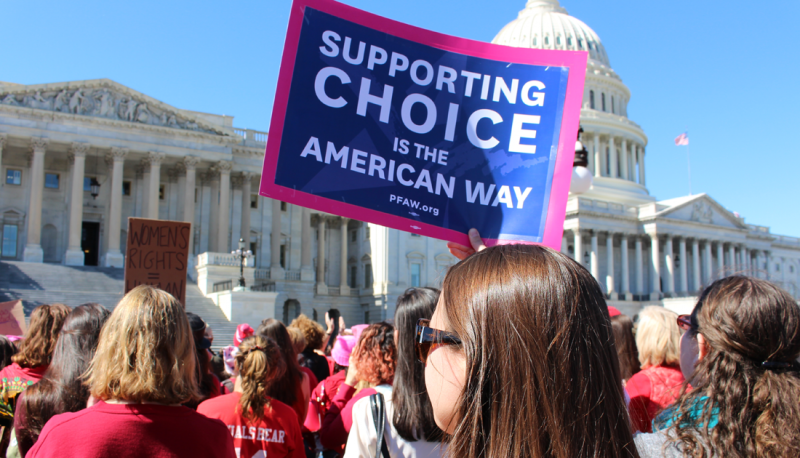“Confirmed Judges, Confirmed Fears” is a blog series documenting the harmful impact of President Trump’s judges on Americans’ rights and liberties. Cases in the series can be found by issue and by judge at this link.
Trump Sixth Circuit judge Amul Thapar completed a six-month crusade to reverse a conservative district judge and reinstate a restrictive Tennessee abortion law struck down by the judge. With the votes of all five other Trump judges on the Sixth Circuit, including John Bush, Joan Larsen, John Nalbandian, Chad Readler, and Eric Murphy, Thapar wrote an August 2021 9-7 decision doing just that in Bristol Regional Women’s Center v. Slatery.
As explained in earlier entries in this blog, Tennessee enacted in 2015 an abortion law that requires that all women seeking an abortion must receive specified information about the procedure in person from a physician and then wait 48 hours and then sign a consent form before having an abortion, even if it is by oral medication. The result is to require “all women seeking an abortion” in the state to “make at least two trips” to the place they will receive care. Several clinics and doctors challenged the law, on behalf of themselves and their patients, contending that it imposes an “undue burden” on women seeking an abortion. In some cases, witnesses later testified, the delay “pushed women beyond the time when they could have medication abortions” or even any abortion “altogether.”
Judge Bernard Friedman, who was nominated by President Reagan, presided over the case. Although he did not consider preliminary relief, he supervised five years of litigation and a four-day trial, and issued a comprehensive opinion of more than 135 pages in which he struck down the law and permanently enjoined its enforcement. The state immediately appealed and asked the Sixth Circuit to stay the decision and allow it to continue to enforce the law as the appeal went forward.
A three-judge panel rejected the motion in a 2-1 decision in which Thapar vociferously dissented. Thapar argued that the failure to grant a stay was so egregiously wrong that the ruling “merits immediate correction by our court” acting in full or en banc.
That is precisely what happened. Clearly following Thapar’s suggestion, the state followed the unusual procedure of asking the full court to simply skip having a three-judge panel consider the merits of the case and do so itself, granting a stay while that was going on. Despite strong dissents, the full court followed that script, leading to an August 9-7 final decision written by Thapar and joined by all the other Trump judges plus several more. The seven dissenters included George W Bush nominees Julia Smith Gibbons and Helene White.
Noting that the Supreme Court had upheld a 24-hour waiting period in the Casey ruling, Thapar claimed that a law like Tennessee’s restricting abortion is valid if it is “reasonably related to a legitimate state interest” and does not place a “substantial obstacle” in the way of a “large fraction” of women seeking an abortion prior to viability. Based on this “deferential” standard, as Thapar called it, he found the law clearly constitutional. He gave relatively short shrift to the district court’s detailed findings concerning the burdens imposed by the state law, noting that they simply “mirror the burdens held insufficient in Casey.” Thapar noted that the law “did not keep a large fraction of abortion seekers” from obtaining one while the law was in effect, and that even if the delay precluded some medication abortions, “safe” surgical abortion “remains available.” Overall, as a matter of law, Thapar concluded that the law was constitutional and reversed the district court.
The lead dissent by Judge Karen Nelson Moore explained what was dangerously wrong with the majority opinion. Initially, she explained, Supreme Court precedent shows that “fact-intensive” review by appellate courts is needed in challenges like this one, including a “thorough analysis of the record” in the district court. Moore summarized in detail the findings in this case, including that the law “burdens the majority of abortion patients with significant, and often insurmountable, logistical and financial hurdles.” But rather than carefully analyzing the “vast pool of evidence” as the Court’s abortion cases “command,” Moore criticized, the majority “improvises a sanitized” and “whitewash[ed]” version of the record “free of uncomfortable realities.” Overall, Moore concluded, the law “forces women into unnecessary and invasive surgical procedures,” contrary to Thapar’s cavalier dismissal of this problem, and “forces low-income women to sacrifice basic necessities for themselves and their families” to obtain an abortion, which is “nothing if not an undue burden.”
Moore went on to criticize several other aspects of Thapar’s opinion. It was wrong to claim that a waiting period law is always constitutional based on the ruling in Casey, she noted, since the Court itself made clear that its decision was based “on the record” before it. Even based on Thapar’s erroneous version of the “undue burden” standard, she continued, the record showed that the burdens in this case are “materially more substantial” than in Casey. It is “simply untrue,” she carefully explained, that the burdens in Tennessee simply “mirror” those in that case. And the fact that some Tennessee women have accessed abortion care “with great difficulty,” Moore went on, does not make the substantial burdens legal. But as a result of Thapar’s decision, Moore concluded, “the scales have now tipped inescapably against women” in the Sixth Circuit, so that “their rights are secondary” and “their burdens immaterial.”
This case reinforces the importance of confirming Biden judges to the federal courts as expeditiously as possible, as part of our fight for our courts. Many of us are understandably concerned about the coming Supreme Court ruling on abortion next term. But before and after that happens, it is critical to have more lower court judges on the federal bench who respect and will seek to protect the fundamental right to choose.

